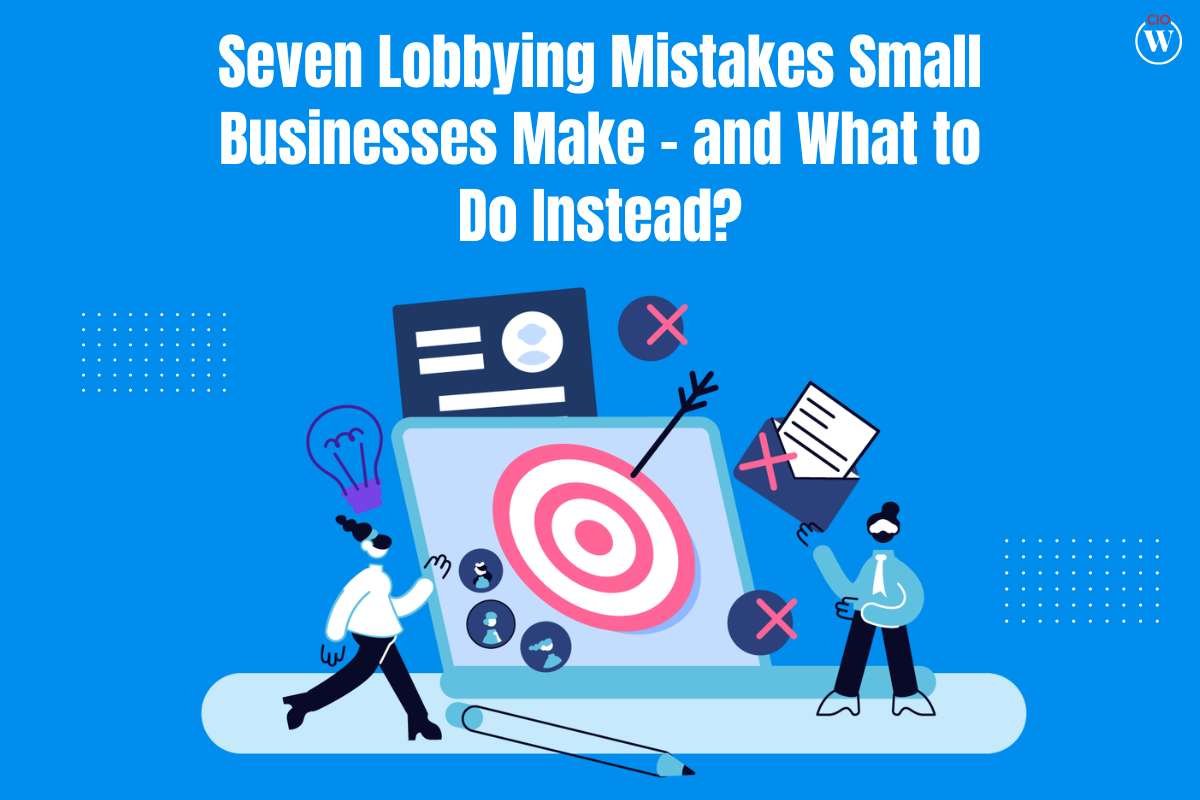Small firms that want to have an effect on the policies and regulations that affect their sector might find success via the use of lobbying as a potent instrument. When it comes to Lobbying mistakes small businesses, however, many small firms make blunders, which may restrict their efficacy and even harm their brand. In this post, we will discuss seven frequent Lobbying mistakes small businesses make, as well as provide suggestions on how those firms might improve their lobbying efforts.
Here are 7 Lobbying mistakes small businesses make;
1. Not Building Relationships with Lawmakers and Staff
When it comes to Lobbying mistakes small businesses, one of the major errors that small companies make is that they fail to create connections with politicians and the staff members of those lawmakers. Because of this, it may be challenging to gain their attention and influence the decisions that they make.
- What to Do Instead
To foster connections with members of Congress and their staff, it is important for small companies to reach out to them on a consistent basis and offer to meet with them to discuss the issues that are important to them. They should also attend public hearings and other events where politicians and staff are present, and while there, they should make sure to identify themselves and explain their arguments to the audience. Also, small companies should investigate the possibility of employing a professional lobbyist who already has established contacts with legislative staff and politicians.
2. Focusing on Short-Term Goals Only
One such error that small firms are prone to making is concentrating just on short-term objectives, such as obtaining a certain tax cut or a change in the law. Notwithstanding the significance of these objectives, it is possible that they are not in line with the long-term interests of either the company or the industry as a whole.

- What to Do Instead
The effects that small firms want to achieve with their lobbying activities should be seen in a larger context and given more consideration. Companies should make an effort to form coalitions with other companies and industry associations in order to lobby for legislation that is in the whole industry’s interest. Not only will this improve the likelihood of success, but it will also facilitate the development of partnerships with many other stakeholders.
3. Failing to Do Their Homework
When becoming involved in lobbying activities, several small firms make the error of not doing their research as thoroughly as they should have. This may lead to individuals having expectations that are not realistic, wasting time and money, and missing out on possibilities.
- What to Do Instead
Before becoming involved in lobbying activities, small firms should do extensive research on the topic at hand. This research should include the existing policy environment, the perspectives of key players, and the possible effect of proposed changes. They should also identify possible friends and opponents, and formulate a plan for how to interact with each of those groups.
4. Being Too Aggressive
While advocating for legislation, small companies can make the error of being overly forceful with their approach. This may cause politicians and personnel to lose interest, and it may also harm the reputation of the company.
- What to Do Instead
While engaging in lobbying efforts, small firms should do it in a measured and courteous manner. When they communicate with you, they need to do it in a way that is unambiguous and succinct, and they should steer clear of making unreasonable requests or threats. Also, they should be open to hearing different ideas and should be prepared to work together in order to find areas of agreement.
5. Not Engaging with the Public

When it comes to Lobbying mistakes small businesses, and small companies often make the error of concentrating their efforts primarily on politicians and staff members, rather than interacting with the general public. Because of this, their efficacy may be reduced, and it may be more challenging for them to get support for their cause.
- What to Do Instead
It is important for local companies to interact with the community and get support for their purpose. They are able to accomplish this goal through organizing and speaking at public events, contributing opinion articles to local publications, and participating in conversations on social media. In addition to Lobbying mistakes small businesses, they should think about forming partnerships with community groups and other stakeholders in order to construct a wider support coalition.
6. Focusing Only on Federal Issues
Small companies often commit the error of concentrating their efforts only on federal policy concerns, to the exclusion of state and local policy issues that may have a considerable influence on their operations. This may be detrimental to the success of the company.
- What to Do Instead
It is important for small companies to be informed about and actively involved in state and local policy issues that may have an impact on their operations. They need to determine who the most important stakeholders are on the state and local levels and cultivate connections with those individuals. They should also give some thought to joining local business groups and chambers of commerce since these organizations often participate in lobbying efforts at the state and local levels.

7. Not Being Persistent
Last but not least, when it comes to lobbying, small firms often make the critical error of giving up too soon when they do not see instant benefits from their efforts.
- What to Do Instead
While advocating on behalf of their interests, small companies should be persistent. Even if they are not seeing results right away, they should maintain their engagement with the legislative staff and politicians. They should also have patience and be aware that making changes might be a slow process. It is possible that the intended effects won’t be achieved without many lobbying attempts spread out over a period of time.
BOTTOM LINE
The practice of lobbying may be an effective method for small firms to exert influence on the policies and regulations that pertain to their sector. Nevertheless, when it comes to Lobbying mistakes small businesses, and small firms often make errors, which may both restrict their efficacy and tarnish their brand. Small companies may boost their chances of success and have a beneficial influence on their sector by avoiding five typical Lobbying mistakes small businesses, having a strategic and collaborative approach to lobbying, and collaborating with other small businesses.









